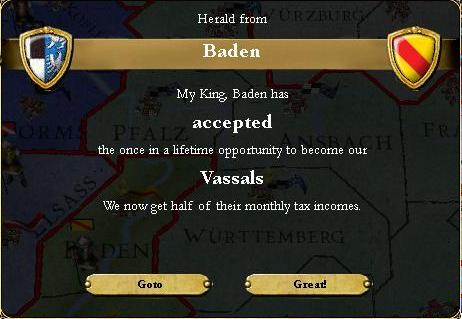Part 37: Europa Universalis III: Chapter 7 - Balance of Power: 1435 - 1450
1435 - 1450: Balance of Power
The 'Imperial Proposition of a Balanced Solution to the French Question' passes with a significant majority in the Reichstag, and Konrad sets about carrying out the policy by guaranteeing the independence of Holland and Brittany, France's most likely targets for conquest.

As a result of its 'soft power' policies, Swabia is a country with a multitide of complex diplomatic relationships and dynastic marriages. The upside is strong relations with many potential allies, the downside is a considerable possibility of getting dragged into dynastic conflicts.
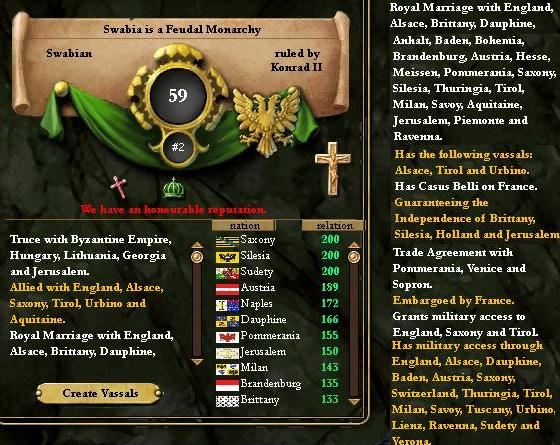
With the tax and toll revenues from Modena and Parma, Swabia's economy is starting to improve, and its rampant inflation has been brought under control for the moment. Aingeru Henke has had a moderating influence on court politics, and budget grants for defense have been cut back somewhat in favor of improving trade, production and taxation.
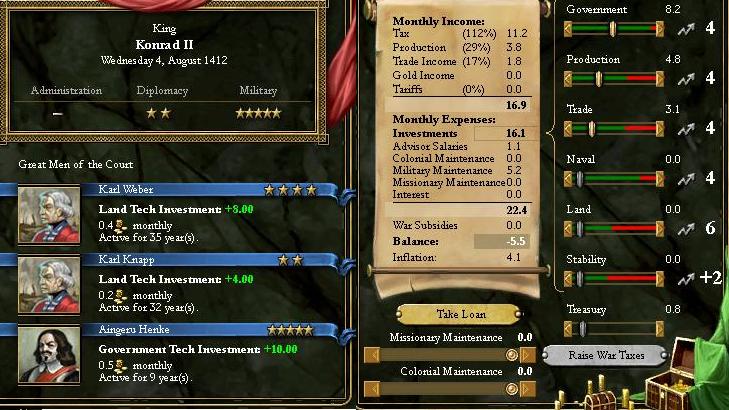
The aristocracy retain their iron grip over Swabia's lands, and only noblemen are permitted to serve in its court. Serfdom has been loosened somewhat as a result of a few concessions to the rebellious peasantry, but for the most part, the country remains as it ever was.
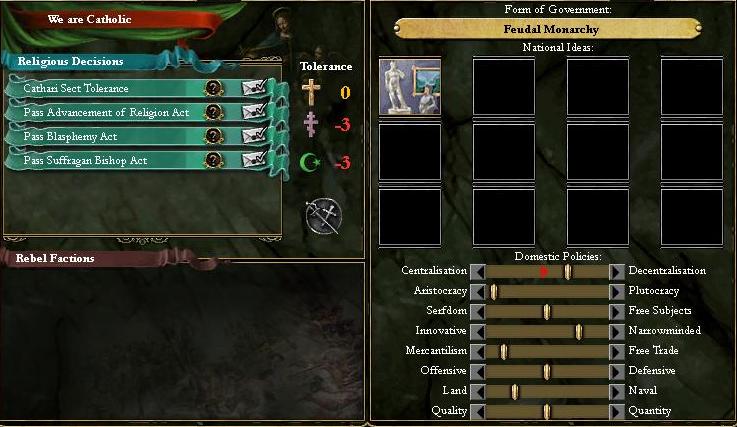
Tried in a half-dozen wars over the last decades, the Imperial Army is a disciplined and skilled force with a strong military tradition among its officer corps, resulting in an unusually competent chain of command.
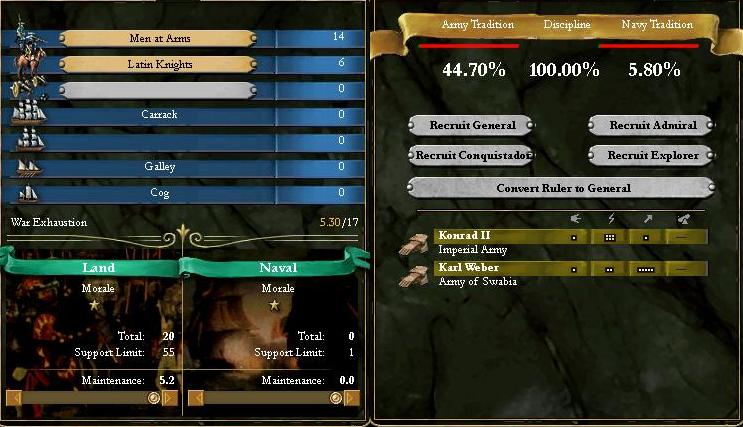
Konrad's son Waldemar is in negotiations with the Duke of Tirol over formally integrating his lands into Swabia, and some promising progress has been made.
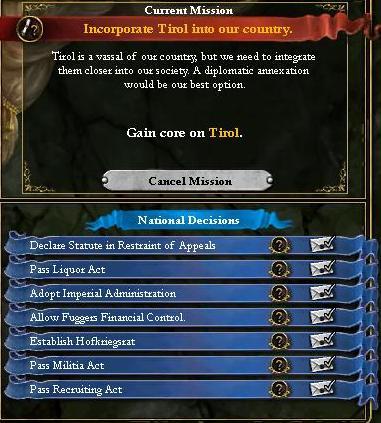
As a result of their prestige and proven ability to defend the Empire from French aggression, the Hohenzollerns are enjoying widespread support among the Electors, though the annexation of Modena has soured relations with Tuscany and Verona somewhat.
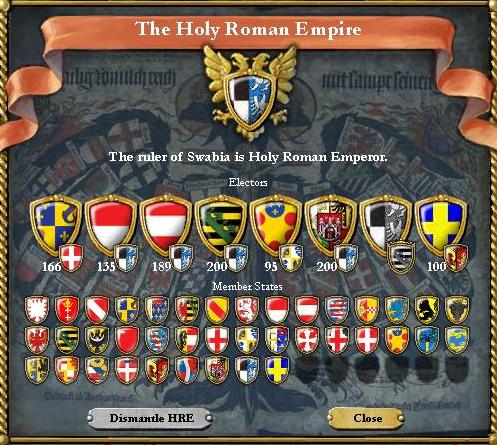
News reach Mainz in September of 1435 that the throne of Scandinavia has passed to the Georgian King. While a little concerning, the distance and cultural difference between the two countries means that the union is highly unlikely to last.
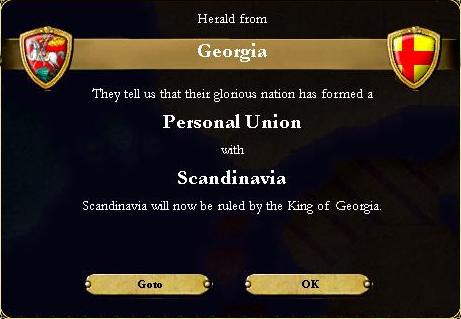
Konrad falls ill that winter, and passes away in February of 1436, the throne passing to his eldest son Waldemar. Waldemar III is a brilliant young man tutored by Aingeru Henke. Gifted in every discipline of statecraft, he is known for his calm demeanor and pragmatism.
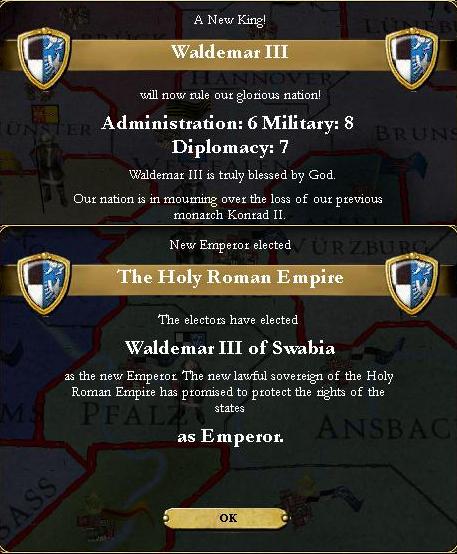
Unlike his grandfather and namesake Waldemar II, Waldemar III sees little point in continuing the feud with the Papacy, and asks Queen Jane to mediate between himself and Innocentius VII. After some twists and turns at the negotiations table, an agreement is eked out: Waldemar agrees to pay the Pope reparations for his lost fiefs, to protect the independence of the Papal States and to return the right of the Pope to crown, though not confirm, the Emperor.
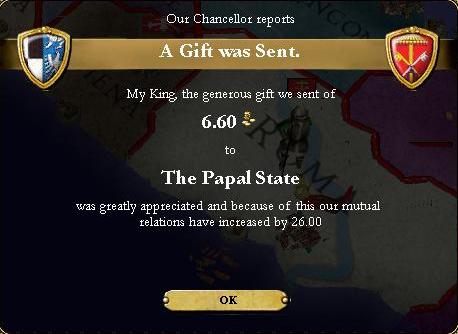

In exchange, Innocentius VII lifts the interdict over Swabia, much to the joy of its commonfolk, and swears not to excommunicate any Swabian ruler so long as they keep their part of the agreement.

As a final gesture of goodwill, Waldemar passes a Swabian Blasphemy Act that forbids ridicule of the church and the faith, a move that upsets the cityfolk slightly and strengthens the position of the church.


Ever the pragmatist, he quickly moves to gain control of the newly empowered church by appointing loyal nobles to its higher offices, a move that grants him some well-needed 'donation' revenue.
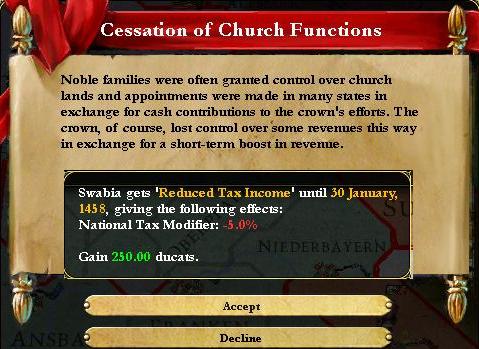
Construction of a small fleet of armed merchant vessels begins in the Imperial City of Modena. It is hoped that this new fleet will save revenue in the long end by removing the need to rely on Venice for renting ship transport.
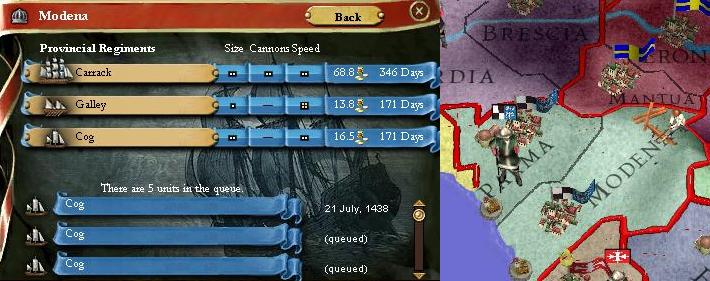
Waldemar's friend and mentor Aingeru Henke has been using his influence with the King to strengthen his position at court, drawing protests from Karl Weber. Waldemar dismisses the complaints despite their obvious validity.
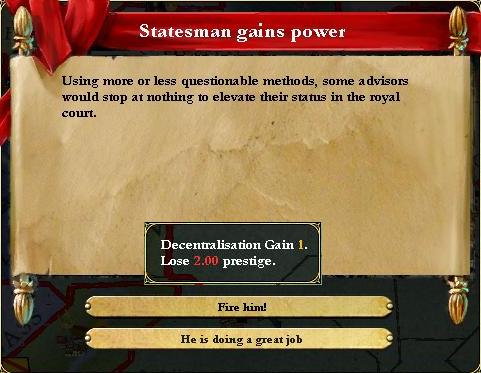
The Caliphate resumes its conquests in 1438, annexing Galicia and large tracts of land in Aquitaine.
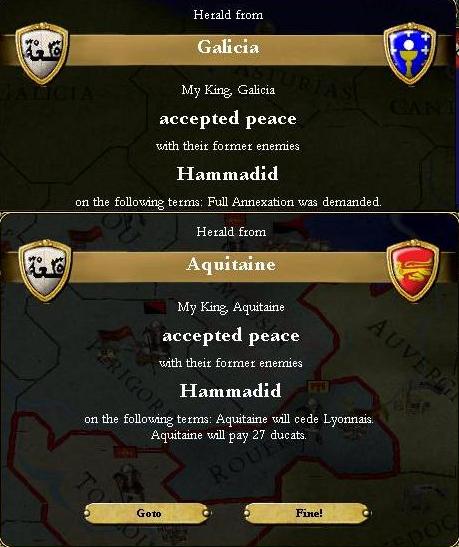
Negotiations for Tirol's annexation finally bear fruit in December of 1439, and the Duchy is formally integrated into Swabia. Tirol's annexation means that Swabia now has direct control over Tirol's silver mines, giving a sizeable boost to its monthly income.
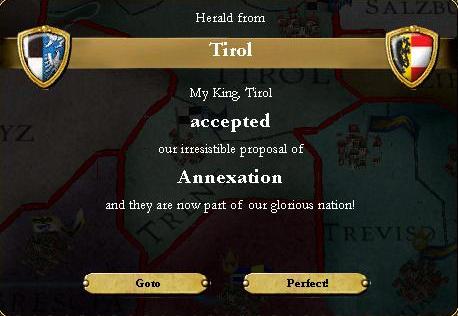
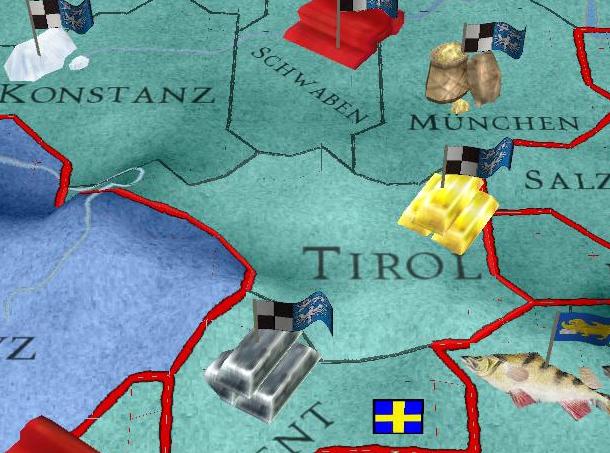
Once again, the Electors remain passive to Swabia's expansion, placated by Waldemar's diplomatic talents.
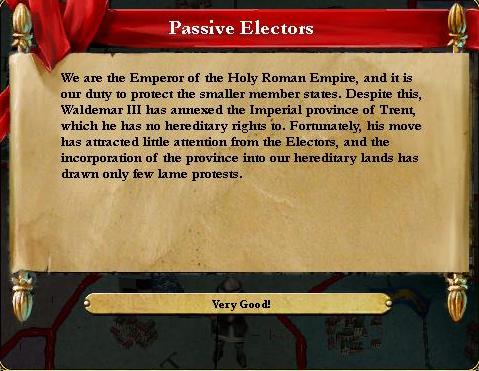
In November of 1440, Queen Jane decides that it is time to resume the conquest of the last independent parts of Scotland and Munster, and declares war on the Scottish King.

Eager to strengthen relations with his ally and give his newly built fleet some exercise, Konrad sends 5,000 men from the second army as help troops.
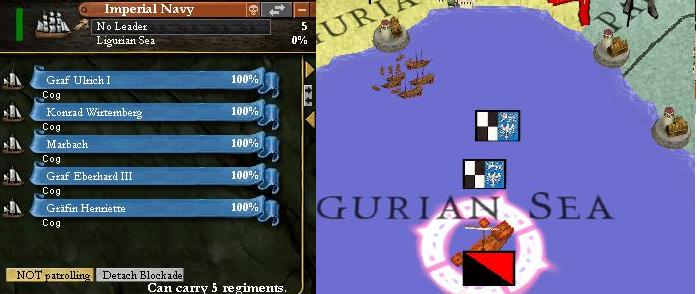
The troops land on Scottish Orkney in May of 1441, meeting little resistance. However, as the fleet heads towards an english port to lay anchor, they are attacked by a scottish Carrack.
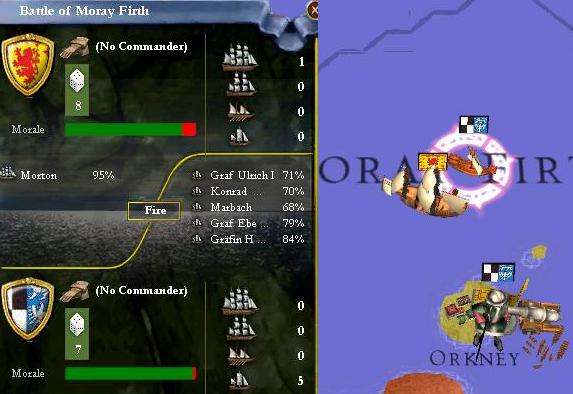
Fortunately English and Breton squadrons arrive in time to save the Imperial Fleet from a humiliating defeat, ramming and sinking the scottish ship.
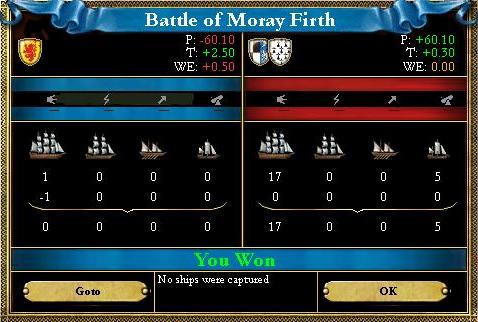
Munster falls in June. Following the diplomatic annexation of the rest of Ireland a few years earlier, the entire of Ireland is now in Queen Jane's hands.
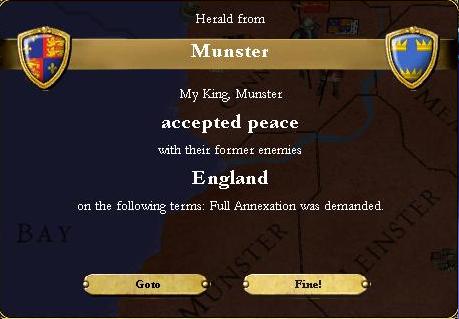
Orkney falls to the Swabian troops in August, and the Scottish capital of Lothren is taken by storm shortly afterwards. King Malcom of Scotland bows his head to Jane, who has fullfilled her vow of becoming Queen of all the British Isles.
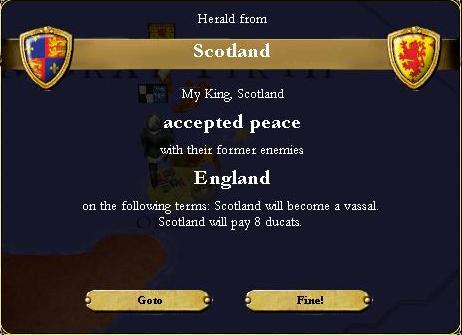
With one ambitious goal complete, Jane begins to prepare for the next - a crusade against the Maghreb Empire of North Africa, a strong ally of the Hammadid Caliphate whose raider ships plague the coasts of the Mediterranean.
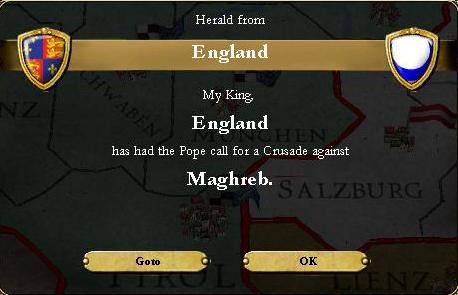
Jane begins discussions with Waldemar of a possible naval attack to liberate Maghreb-occupied Tripoli, but the discussions are interrupted in April of 1444 by a far more immediate foe rearing its head: France has declared war against Holland, and Swabia finds itself drawn in along with Aquitaine as a result of its guarantee.
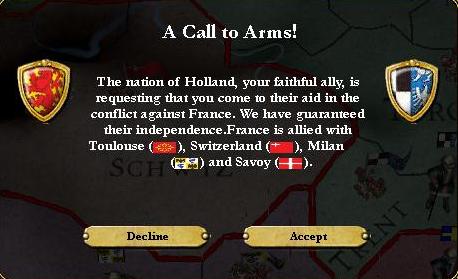
The war begins predictably enough, with massive numbers of French troops swarming the Rheinland and seizing Pfalz. The French are tiresomely predictable if nothing else.
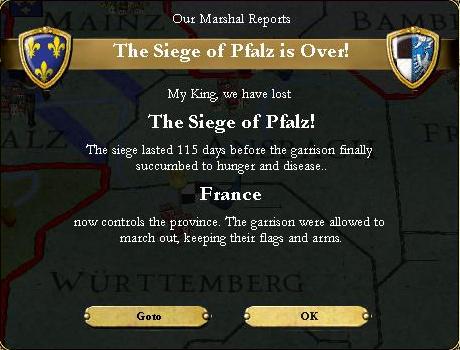
Aquitaine is quickly crushed by a French army and forced to cede yet more of its rapidly shrinking domain.
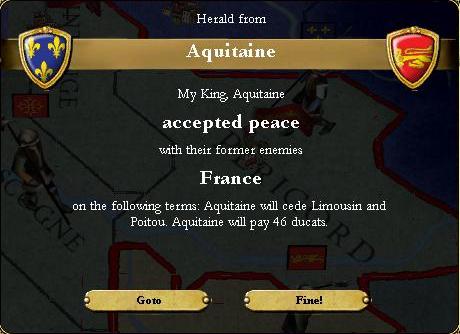
Instead of wheeling to meet the French to the Rheinland, Waldemar sends his generals to attack and occupy France's allies Milan and Switzerland. A large French help force is met and defeated in Bern in December.
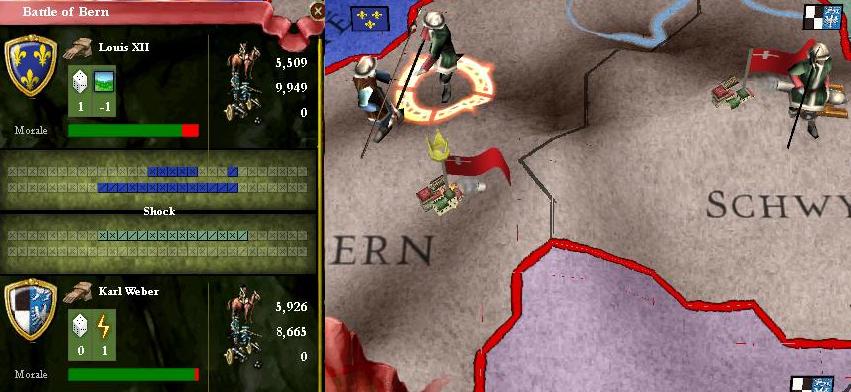
Before long, Switzerland is fully occupied by Imperial troops and the Swiss are forced to sign a separate peace and swear vassalage to Waldemar.
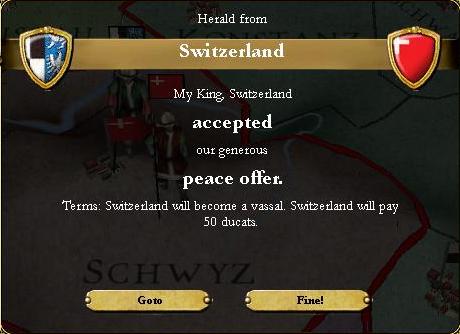
A second French army of 15,000 men is sent into Switzerland in 1445, where Waldemar meets and defeats them, pursuing the Frenchmen into Franche-Comte and wiping them out.
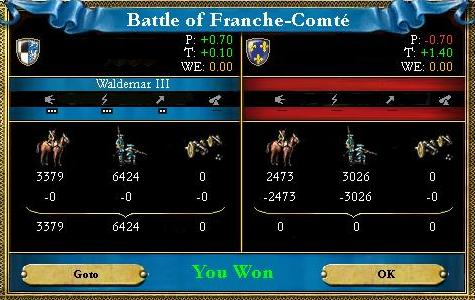
Mainz falls, followed by Holland, who are forced to cede half their territory to France.
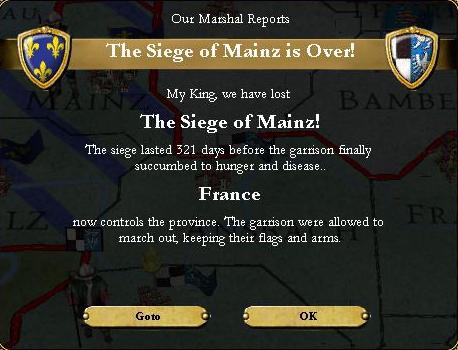
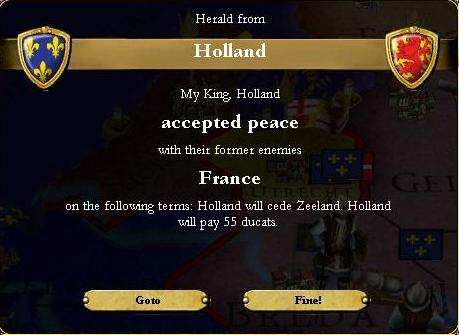
Milan is defeated and subjugated in March of 1446, leaving only France and Swabia in the war.
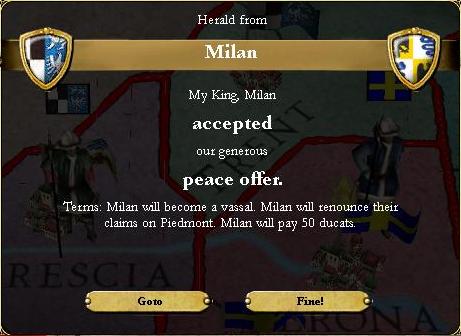
In the midst of this war, a second one starts, as the King of Naples passes away without heirs. Willing his throne to Swabia, his will is contested by Sicily, who see Swabia's war with France as an opportunity to wrest Naples from the Empire. Unable to spare any troops, Waldemar can only hope that the Naples' own armies will be sufficient to deal with Sicily.
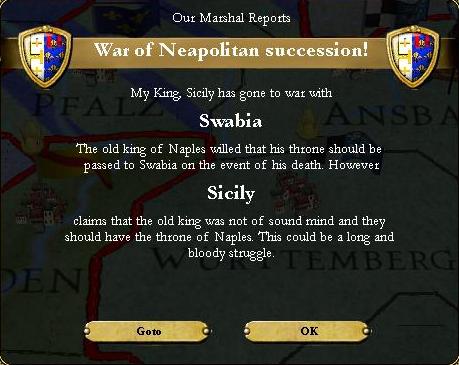
With France soundly defeated in the south, Waldemar turns back towards Swabia to launch an offensive into the occupied Rheinland in August of 1447.
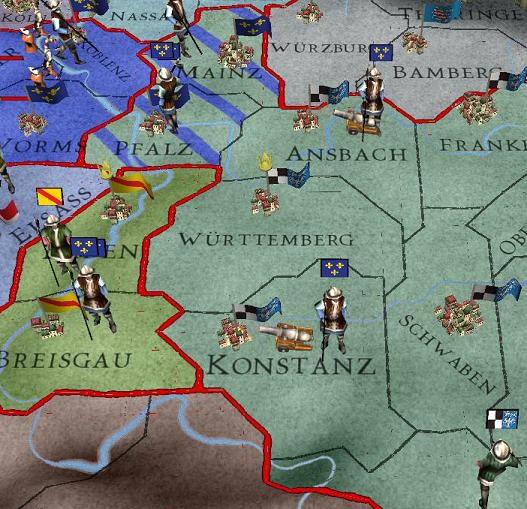
Just as the Imperial Army is entering Ansbach, news reach Waldemar that the Hammadid Caliphate has declared war on Aquitaine, and France's warning to the Caliphate against starting further wars has drawn it into the conflict. Seeing his chance, Waldemar offers Louis XII as white peace, which the French King agrees to, rather than fight a war on two fronts.

Though Swabia failed to protect Holland and Aquitaine, France's loss of its allies Milan and Switzerland makes both sides consider the war a draw. No longer facing French invasion, Waldemar turns his full attention to the succession war in Naples, where Sicily has gained the upper hand. Abruzzi and Apulia are quickly liberated from the occupiers.
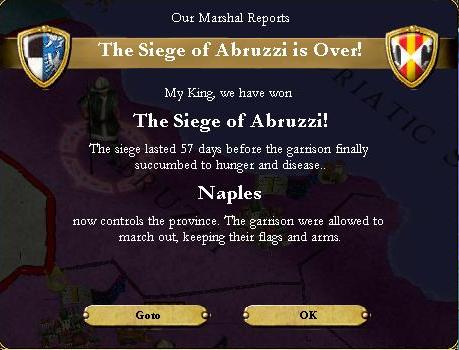
Before long, the Imperial Army is standing on Sicily, and the Sicilian King is forced to the negotiations table, surrendering his claims on the crown of Naples. Waldemar is now King of Swabia and Naples.
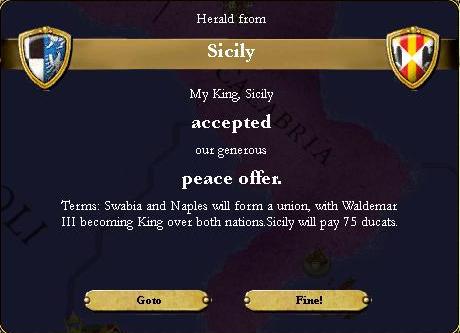
As the wars die down, a few quiet years of recovery follow, the only notable event being the Duchy of Baden's re-incorporation as a Swabian vassal in winter of 1449.
